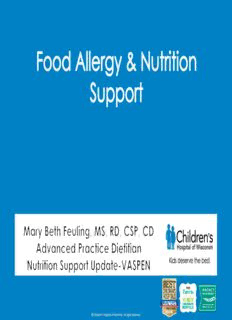
Impact of Food Allergies PDF
Preview Impact of Food Allergies
Faculty Disclosure I have nothing to disclose. Question #1 A 7-year-old boy with A. Intravenous fat an enterocutaneous emulsion fistula develops an B. Amino acid urticarial rash the day solution that he is started on C. Pediatric parenteral nutrition. Multivitamin All of the following solution constituents of his D. Dextrose parenteral nutrition could cause the rash EXCEPT: Question #2: An 18-month-old vegetarian A. Fat girl with presumed milk and B. Vitamin D soy protein allergy is drinking C. Energy 32 ounces of enriched D. Zinc almond milk per day. She also eats rice, wheat, corn, fruits, and vegetables but does not consume any egg or meat products. She does not receive any vitamin or mineral supplementation. You are concerned about her intake of all of the following EXCEPT: Question #3: A 6-year-old Asian boy is seen A. Assessment of growth and nutrient intake by a dietitian for follow-up nutritional assessment and B. Suggesting an age- appropriate beverage education. His parents report he is allergic to milk, soy, and C. Recommending follow-up with allergist as patient is peanuts. He has a history of tolerating milk and soy anaphylaxis while eating D. Suggesting food peanut butter a year ago. His challenge of peanut current intake includes tofu stir- butter at home fry and milk chocolate candy bars. Parents report he eats these foods at least once a week without any problems. He does not drink a milk substitute. All of the following must be done or considered at this visit EXCEPT: Question #4 A 6-month-old breastfed A. This consistent with IgE- infant has significant mediated anaphylaxis. vomiting and diarrhea B. This is most likely food within hours of being given protein-induced a bottle of cow’s milk enterocolitis syndrome formula. His mother reports C. Cow’s milk protein must that this has happened be eliminated from the each time he has been fed child’s diet the formula. She denies any D. In addition to skin rashes. A serum lab for breastfeeding, a protein IgE directed against cow’s hydrolysate formula milk protein is negative. All may be appropriate of the following are true about this child EXCEPT: Learning Objectives • Improve understanding of nutrition management of children with multiple food allergies • Describe the nutrition assessment of children with food allergies • Understand the food and non-food issues that may impact the provision of nutrition support in children with food allergy Food Allergy – Concern? • Increased public health concern in Western World • Greater problem in children than in adults • Associated with poorer nutrition outcomes What’s the story? • “Telling Food Allergies From False Alarms” (The New York Times) • “Is Your Kid Truly Allergic? Tests Add to Food Confusion” (The Wall Street Journal) • “Adverse Reactions to Food: Allergies & Intolerance” (Digestive Diseases) • “’Allergic Girl’ teaches how to eat out with allergies” (CNN.com) • “This allergies hysteria is just nuts” (British Medical Journal) • “Children at risk in food roulette” (ChicagoTribune.com) • “Fear and Allergies in the Lunchroom” (Newsweek) • “Food Allergen’s Attack” (Food Service Director) • “Food Allergies Take a Toll on Families and Finances” (The New York Times) Food Allergens Identified as a protein or glycoprotein Food Allergy May be more or less common Resist depending on denaturation the society or by heat or acid ethnicity
Description: